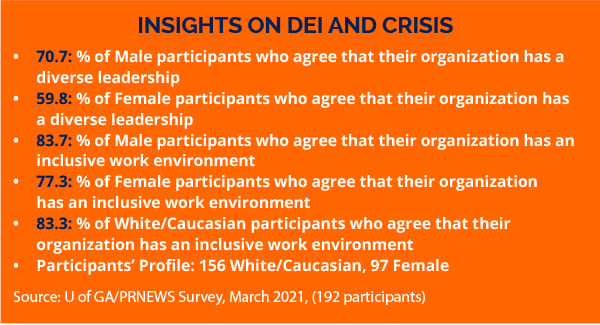
An oft-heard refrain is ‘We all have biases.’ One question is how biases inject themselves in crisis and crisis communication.
Those are some of the questions a new study from the University of Georgia and Crisis Insider aims to answer.
The study also explores how communication executives and PR pros assess complex and challenging industry-wide issues (e.g., workplace health, ethics in conflict management, and diversity, equity and inclusion [DEI]).
As we know, such issues are influencing organizational crisis preparedness. Survey respondents identified essential elements required for organizations to be prepared to tackle these challenges.
The research also provides insight into general crisis leadership and issues management for communication professionals.
So far, the preliminary data (192 respondents) show significant differences related to the perceptions of a diverse workforce, leadership and inclusive work environment between women and men [see chart, below].

In addition, it appears that there are significant differences in perceptions among diverse racial and ethnic groups, but there are too few participants with diverse racial and ethnic backgrounds at this time to make solid conclusions.
That most participants in the survey are White PR pros we expected to some degree. This reflects the lack of racial and ethnic diversity in the PR workforce. Still, we would have liked to include insight from additional practitioners with diverse backgrounds.
Perception and Reality
Practitioners’ perceptions are critical when they evaluate situations/environments and make important decisions related to an organization’s positioning.
If an organization’s perceptions about DEI issues are different from those of the public, there is the potential to create a discrepancy.
For example, when communicators perceive that the organization’s workforce or leadership is diverse and its work environment is inclusive whereas its publics perceive otherwise, this may lead to an incident that could develop into a PR crisis.
Thus, organizations should consider hiring independent firms for DEI audits or set clear DEI goals and objectives to ensure that the organization has a diverse workforce and leadership as well as an inclusive workforce.
Preliminary Results
As we noted above, thus far we have surveyed 192 adults who are PR pros in the United States. All participants are at least 18 years of age and span across groups such as gender, education, company size and ethnicity.
The survey is active until March 15, 2021, and available through multiple PR networks. Data collection will continue through March.
Surveyed practitioners’ assessment of these key issues and their organization’s preparedness is measured through a 7-point Likert or Likert-type scale 1-7, where, for example, 1 indicates “completely disagree” and 7 indicates “completely agree.”
Next month’s Crisis Insider will include a full article on the survey’s findings.
–Sara Ervin and Solyee Kim
Sara Ervin and Solyee Kim are PhD students at the University of Georgia
